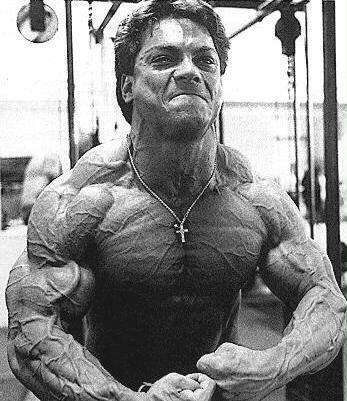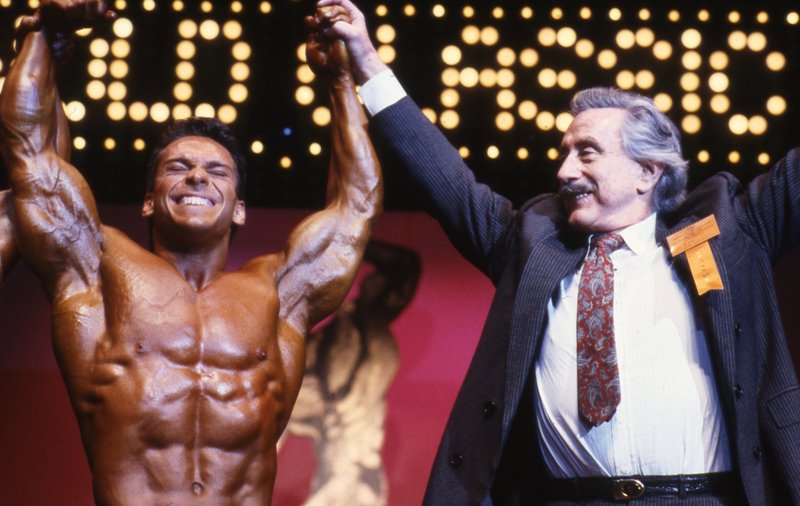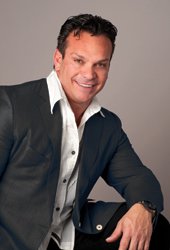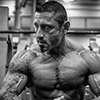Trying to pin Rich Gaspari down on the phone was an endeavor months in the making, but really, I have been looking forward to this interview for many years.

When I was eighteen years old and suddenly became obsessed with bodybuilding, it was photos of the freaky young guy from New Jersey with all the veins, Rich Gaspari, that I cut out of the magazines and taped to my walls.
The Dragon Slayer represented a blue-collar work ethic and the fierce determination of a pitbull, things I could identify with as a fellow East Coast kid. Rich started out with a skinny body and went on to become one of the greatest bodybuilders of the 20th Century.
If that wasn't inspirational enough, he started a supplement company from scratch, out of his mother's basement - and grew it into the powerhouse it is today, with a unique reputation for effective products that is unequaled throughout the entire industry.
Finally, I had the chance to sit down and talk about the rise of Gaspari Nutrition, and where it's headed from here.
I was a huge fan of yours and you were a big inspiration to me back in the late 1980's when I was getting into all this. That was all before the Internet. Do you think there was a certain mystique around the sport that pretty much disappeared once everybody had their own web sites and emails, and we had updates of every little thing the pro's did on a daily basis?
Just like you, when I started out we depended on the magazines for almost all our information. And back then, at least to me, the pro bodybuilders were almost like Gods among men. We definitely didn't know a whole lot about their day-to-day lives.
I think any type of celebrity in sports or entertainment had a lot more mystique before the Internet came along. But the best part about the Internet is that there is such an incredible amount of information out there for anyone to have access to instantly.
It's not all good, reliable information - there's a lot of misinformation and bad advice out there too. Those who know how to filter out the bad or useless information have a huge advantage. A person could give themselves a pretty comprehensive education in training, nutrition, and supplementation.

You turned pro at 21 and were retired at 33. I'm curious, what was the transition like from being a competitive pro bodybuilder to owning a supplement company? Were there a few years in between when you were trying different things and deciding what to put your time and energy into for the rest of your life?
By the time I was 29, I knew I needed to get something else going. I knew pro bodybuilding, like any professional athletic career, couldn't last forever. So I bought a gym in Ocean, New Jersey that was supposed to be the business I would retire in.
Unfortunately, the location wasn't great and eventually I had to sell the place three years later. In the meantime, I was personal training and doing nutritional consulting.
I was still competing and making the top five, but honestly I was getting tired of it. Burnt out. I had been competing since I was in high school. The turning point happened when I was 33 and training for the Night of Champions. While doing barbell shrugs with 600 pounds, I herniated two disks in my neck.
The right side of my body was virtually paralyzed, and I was stuck in bed for over two months, unable to walk. The pain was excruciating. I had a lot of time on my hands to think, and I came to the realization that I couldn't depend on my body to make a living anymore.
So I thought of various things I could do, and the one idea that kept coming back was that I wanted to start a supplement company.
Just like that? And how did you go from that idea to making it happen?
It's so funny looking back, because I really had no idea how I was going to do it. Things like the manufacturing, pricing, it was all foreign to me at the time.
I went to a couple manufacturers in New Jersey. I was a pro bodybuilder, and my idea was to make the very best supplements on the market, products that would be more effective than anyone else's.
I remember one guy literally looking at me like I was insane. He asked me how much money I had to spend on advertising, and the answer was none. All that time in bed, I couldn't work, and Weider had cancelled my contract.
I had been forced to sell my house and move back in with my parents, which was a huge step back for a guy that had been so successful at such a young age. I had seventy five thousand dollars to my name that I wanted to invest in manufacturing my supplements.
This gentleman explained that without marketing my line, without substantial advertising, I wouldn't sell anything. He also tried to convince me that I should switch my focus from developing the best products to coming out with products that had the largest profit margin on them.
Needless to say, I never did business with that manufacturer. Years later, I found a couple of key guys who shared the same goals as me and together we worked to develop some groundbreaking products.
When Gaspari Nutrition was launched in 1999, what was the original product line? It was only a couple products, if I recall?
I had a few very basic products. There was a whey protein, a multivitamin, a simple fat burner, which was nothing crazy - it didn't have ephedra in it even though that was big at the time.
One of the most popular products, one I did well with locally in gyms, was called Quick Meal. It was a protein drink in a bottle. We had a creatine product, too. I used to get the creatine in enormous drums and then repackage them myself into the containers.
How has the economy affected Gaspari Nutrition?
The great thing is that we are in a niche market. For people who are serious about getting in shape and staying in shape, they will continue to do that even in times like these.
And they have been taking our products and know the value supplements can have in reaching your physique goals, so for the most part they will keep buying them. Of course, things will be better for everybody all around once the economy bounces back.
Amen to that! You're also a dad now. How do you find time to spend with your kids?
It isn't easy, but I make time. Once I get home, from then until the kids go to bed is their time with me. I just got a web cam for my laptop, so next week when I'm on the road I'll use that to talk to them every night.
You're also doing a lot with the web site. I hear it's not only getting a total makeover, but there will be a ton of new content too
Yeah, we are developing it as more of an informational web site with a wide variety of features. You can access Gaspari video's here with training features from our athletes Flex Lewis, Mark Alvisi and myself included.
We have also developed a new feature at www.gasparimobile.com where you can sign up to have new motivational text messages sent to you every day. And you know from working on new content that there will be a wide range of articles.
The goal is to make the Gaspari website a place that encompasses the bodybuilding and fitness lifestyle where people can come to gain and share information and inspiration.
Sweet! One of the most exciting events I have been to recently was the first Dragon's Den training and nutrition seminar at Apollon Gym in Edison, New Jersey. Where did the idea to put something like that together come from? And what can people expect to see in future Dragon's Den seminars?

The concept was to hold workshops where people could come and learn about proper training techniques, nutrition, and supplementation, all free of charge. It's really my way of giving back to the sport and to the fans that have supported the company.
I talked about motivation and the importance of believing in yourself before I did the portion on posing and presentation. Flex Lewis showed people all about proper back training, and Mark Alvisi handled chest.
Fitness Pro Erin Riley was in charge of going over the best methods to work legs, and Daniel from the company went over off-season nutrition.
The premier edition in New Jersey had 120 people, and the second Dragon's Den in Tennessee had over 300. We literally didn't have enough room for people to fit and listen to my opening speech on motivation. I want to do more of them across the USA, and possibly even go international with them.
You helped out Flex Lewis quite a bit for his debut at the Tampa show. Do you plan on doing more of that this year, not only with him but also Mark Alvisi?
I think Mark has his training and his prep down pretty well at this point. The area I want to help him with the most is the same thing I helped Flex improve on quite a bit - presentation.
As an IFBB judge, I see so many athletes that look incredible but don't know how to show their physiques correctly. It makes such a difference. This is one of the reasons why I have included a posing seminar at the first two stops on the Dragon's Den Tour.
Switching gears a little, but do you ever miss the old days of being a pro athlete at all? Does it bring back a lot of memories when you go to the shows?
I loved what I did as a competitive bodybuilder. At the same time, I feel people go through different stages in life. That part of my life is in the past now.
Now I would much rather pass on my knowledge and experience to the newer generations so they can benefit from them. Life is about going forward, not backward.
How would your training over the past few years compare with the type of regimen you followed back in the days when you were Haney's worst nightmare? I imagine that workouts have taken a backseat to running a big company like yours
I still train five times a week. It's not quite as heavy as it used to be, but I have maintained a decent amount of strength. I can still do any type of press with 110's, curl 70's or 80's, and do lateral raises with 75's or 80's. The reps are higher now than in the old days, out of respect to my joints.
My split these days is usually:
When I was competing in the Mr. Olympia, I didn't break the body up into so many days. I did it all in three days, usually in double splits. With a rest day in between, I worked each body part twice a week. I was younger then, of course, and I lived and breathed the sport.
When did you first get the idea for getting back into awesome shape again?
It was really something I saw as a personal challenge. Here I am, twenty years after my heyday, and it would be fun to see just how good I can look again if I really put my best effort into it again.
I'm not really interested in getting quite as big as I used to be, but I do want to be 'Ripped Richie' again.
How much more time will you be committing to your training once you start your transformation?
The weight training really won't change much. I just need to add in more cardio. In the early stages of my pro career, my metabolism was so fast that I didn't even need to do cardio. Right now to keep a six-pack, I do twenty minutes three or four times a week.
What do you weigh now, and what would you estimate your body fat to be? What would be nice goal for you to hit? I know from seeing you at various times that you're never too out of shape at all
Right now I am around 215 at eight or nine percent. I would like to be about the same weight, maybe a few pounds lighter, but shredded.
Did you ever have your body fat tested back in the old days when you had the famous striated glutes?
Yes I did. Both skinfold and hydrostatic weighing had me at one percent.
What has it been like being on the judging panel of the IFBB? Do you see things from a totally different perspective than you did when you were competing?
As a judge, you are seated up front and very close to the athletes. You see things there that the people many rows back don't. And a lot of times, fans only go to the night show and really have no idea how the guys may have looked differently earlier that day or the night before, or even how they looked compared to the other competitors.
So it's understandable that they can get upset when their favorite pro doesn't place as well as they feel he should have.
Another thing that I do as a judge is that I look at the physique as a whole rather than analyze specific body parts. There needs to be a balance, and proportionate development.
Some fans may love a guy because he has an awesome back, for example, and look past the fact that his legs are too small for his upper body.
Most of all, I always want to be fair and do the right thing by the athletes. As a former competitor, I know exactly how hard they work. I try to always judge what's in front of me, and not be influenced at all by who is a big name, or who looked great at some other show.
Do you understand why guys get frustrated when they don't place where they thought they should have? Do they come to you for critiques?
They do. The funny thing is that before the show, everyone is your friend. After the show, usually only the winner is still your friend! At that level, we have to nitpick as judges.
Most times the winner is fairly obvious, but once you start getting into who deserves to be second, third, fourth, and so on, it gets tougher and tougher to sort them out as fairly as you can.
I know what it's like being up there and posing your heart out, and all the hard work that leads up to that day. So it's very important to me that I give every competitor the most fair placing I can.
Well, as a longtime Dragonslayer fan, I wish you continued success, and I also look forward to seeing 'Ripped Richie' again!
Thanks, Ron
